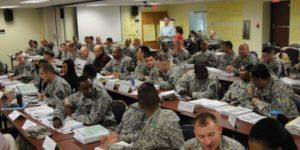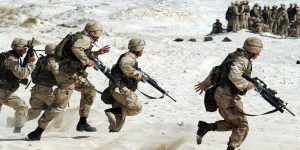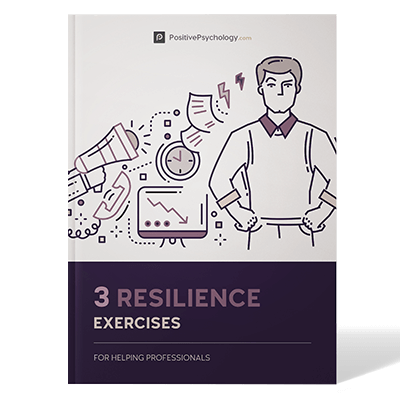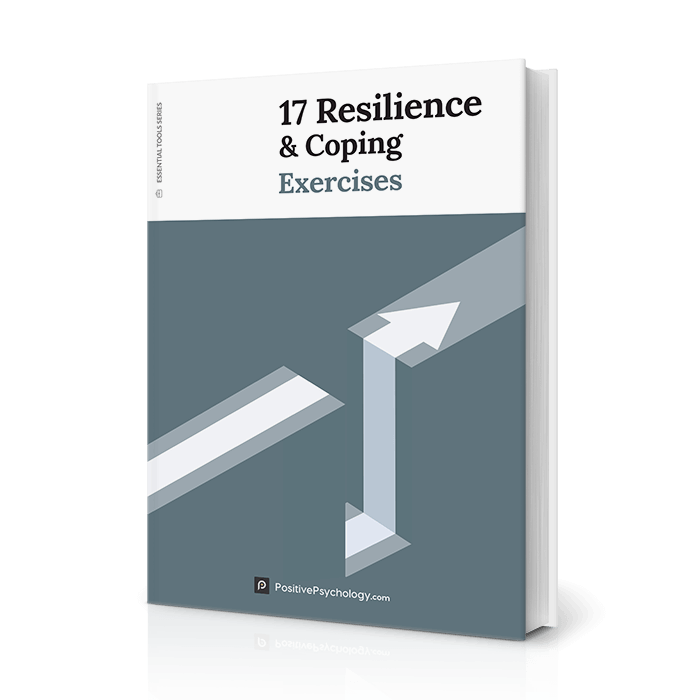Master Resilience Training (MRT) in the US Army (+PPT)

Many of its members have endured stresses we could never comprehend.
Have you ever wondered how the Army prepares future soldiers for these stressors? How do they train soldiers to remain calm while facing extreme situations? And ultimately, how do they help these soldiers cope afterward?
Surely from such rigorous training, we can take pieces from their program to benefit our own clients and organizations.
To that end, in this article we review the Master Resilience Training (MRT) program to answer each of these questions. We will also share our discussion with an experienced program instructor and a slide presentation accompanying the robust MRT training.
Before you continue, we thought you might like to download our three Resilience Exercises for free. These engaging, science-based exercises will help you effectively deal with difficult circumstances and give you the tools to improve the resilience of your clients, students, or employees.
This Article Contains:
Master Resilience Training in the US Army
Resilience is “the process of adapting well in the face of adversity, trauma, tragedy, threats, or even significant sources of threat” (Zhang et al., 2022, p. 577). It is critical that soldiers be not only physically fit, but also psychologically fit. So how does this robustly resilient entity ensure its members are psychologically fit?
They use the US Army Master Resilience Training (MRT).
This 10-day course prepares soldiers and civilians to develop their own resilience and teach others. Participants are immersed in large group sessions, small group work, and partner and individual exercises that introduce the six competencies explained below. Fourteen distinct skills accompany the implementation of these competencies.
Is this program effective?
In a study by Griffith and West (2013), 611 resilience-trained Army National Guard soldiers and civilians completed online questionnaires about their resilience training experience, and their responses suggest it is effective.
Participants showed the following positive outcomes as a result of resilience training (Griffith & West, 2013):
- Training was helpful and improved resilience competencies that enhanced coping with stressful circumstances.
- Competencies were subsequently used in their military and civilian jobs.
- Participants reported increased self-awareness and strength of character, including improved optimism, mental agility, and connection with others.
- Participants reported fewer behavioral health symptoms.
The 6 MRT competencies
The MRT includes six competencies:
- Self-awareness
- Self-regulation
- Optimism
- Mental agility
- Strength of character
- Connection
These six competencies are critical characteristics of a resilient individual.
Course schedule
The preparation component of the MRT train-the-trainer course comprises five separate modules, while the sustainment and enhancement components each consist of their own modules. This means that the entire MRT train-the-trainer program consists of seven different modules taught over the course of 10 days.
These modules, in the order that they are taught and paired with a brief description, are (Reivich et al., 2011):
- Resilience (2.5 days)
Covers several topics, from what resilience is to which mental factors contribute to resilience. Self-awareness and optimism are included in this portion of the training. - Building mental toughness (2.5 days)
How to cultivate mental factors that contribute to resilience by promoting problem-solving and gratitude, among other skills. - Identifying character strengths (one day)
Identifying character strengths in oneself and in others. - Strengthening relationships (one day)
Strengthening relationships among soldiers, as well as between soldiers and the other people in their lives, such as family members. - Concluding preparation module (half-day)
Revisits the first four modules and focuses on training soldiers to teach other soldiers these resilience skills. - Sustainment module (one day)
Reinforcing resilience skills throughout the military career and applying these skills in a military-specific context. - Enhancement module (one day)
Mental skill foundations, building confidence, goal setting, attention control, energy management, and imagery.
MRT in Army regulations
The curriculum used in MRT is grounded in the field of positive psychology and derived from many of the materials developed by the University of Pennsylvania and the Penn Resilience Program.
Similar to the Comprehensive Soldier Fitness program and contrary to traditional approaches, MRT is proactive. In other words, this program establishes methods of improving resilience for all members instead of addressing the negative outcomes of stress after the fact (Cornum et al., 2011). Personal growth is the ultimate goal.
Army Regulation 350-1 mandates that all soldiers receive this training. Select soldiers, civilians, and spouses have the opportunity to get certified to train the troops at lower echelons in the train-the-trainer course. These individuals can then share their learning with fellow soldiers and family members upon return to their unit.
Army resilience training PowerPoint
Perhaps you are a visual learner and would benefit from viewing a slide presentation about this training. You could also modify this presentation to fit your organization’s needs.
The presentation summarizes the entire MRT program and includes a synthesis of each module and what it comprises.
For further reading, you may want to browse this Resource and Activity Guide created by the US Army.
Click here to access this presentation.
An interview with an experienced MRT trainer

While we worked hard to provide a useful description of MRT, there is no replacement for a description from someone who has actually gone through the program.
Fortunately, we have been in touch with an MRT trainer who has taught the program for years and was generous enough to share his experiences with us in this interview.
Chaplain (Captain) Mike MacKrell is an expert in MRT and truly enjoys sharing its lessons with his fellow soldiers in the Army.
He kindly took some time out of his busy schedule to give us insight into the inner workings of the program, which he has taught to soldiers and civilians alike. If you want to learn about MRT, this is an excellent place to continue your education.
For clarity’s sake, the questions we sent to Chaplain (Captain) MacKrell have been numbered. His answers are directly under the corresponding questions, and a quick wrap-up written by us (not him) follows the questions.
Please enjoy this interview about MRT with one of its proponents, and we can only hope that you learn as much from reading this interview as we did by conducting it.
1. How did you become an MRT trainer?
“I was on active duty standing up a resilience team to serve our soldier and family population where I was stationed and needed to get an overview and understanding of the program. I enrolled in the class, and I am an ardent follower from the start.”
2. What aspect of MRT has stuck with you the most?
“Because of my love for soldiers and everything that has to do with psychology, I was all-in from the start. The material has affected my life in so many good ways. The material provides basic working models that apply to situations and contexts we all find ourselves in. It is not a cure-all, but a framework for approaching life.”
3. What was the easiest part of MRT to teach?
“One of the first modules I learned was ‘Hunt the Good Stuff’ — a module designed to augment optimism and fight the negativity bias we all possess. I had just received a life-altering email, and because of the place I was in, the material saved me from self-loathing and catastrophizing. No joke. The planets aligned for me that day.”
4. What was the hardest?
“The most difficult module for me initially was entitled ‘Problem Solving.’ Due to the emotional and relational nature of the news I received, I was transferring so much of me into the training and thus became unable to objectivize the problem sufficiently to really listen and face my circumstances.
“Now, eight years later, I can share what I have learned and do a much better job at teaching that portion of the training. The practice has made me a better learner and teacher.”
5. How well do MRT’s teachings translate to civilians?
“Very well I believe, if your view of life, like mine, is broader than just wearing a military uniform. Because I entered the military later in life, my experiences are mostly on the civilian side. I have heard and concur with many MRTs that seeing the material’s utility in a broader sense is a more useful approach than just applying it to the rhythms of military service.”
6. Are there any difficulties in teaching it to civilians compared to soldiers (or vice versa)?
“Depends on your mindset and sensitivity to life outside the military. If a trainer is reluctant or resistant to get to know their audience (which may be both civilian and military), I think they limit their ability to instruct, persuade, and apply life lessons that are easily understood by all.”
7. How is MRT unique compared to other things soldiers are taught in the Army?
“Other than the curriculum used in the Army’s ‘Strong Bonds’ program (marriage enrichment and single soldier and family material), it is one of the better programs of instruction the Army has ever had. Obviously, I am biased.”
8. In what ways have you found it easier to teach MRT as you have gathered more experience doing so?
“After practicing this for eight years, I can now share both success and failure stories with participants from my own desire to apply what I have learned in my life and significant relationships.”
9. Is there any advice you would give somebody teaching MRT for the first time?
“Do your homework long before your first class. Read more than just the footnotes. Get with other MRTs and get their help and insights. Soldiers are quickly turned off by slide clickers — trainers who merely read the slide and don’t have a conversational experience using the material. This helps no one. Approach your audience as co-learners. Refuse to pontificate. Be vulnerable with your audience and learn from them as well.”
10. What was your experience learning about MRT for the first time?
“It was wonderfully incredible. I guess I was in the right frame of mind and came to the table at the right time.”
11. Is there anything else you would like to share about MRT itself or your experiences teaching MRT?
“It has been my privilege to familiarize and train this curriculum with soldiers and civilians in the Middle East on two deployments, in the Czech Republic two different times, and on many civilian bases. Every time I am up to bat, my preparation yields new insights. I have been the beneficiary far more than anyone I have spoken with. If a trainer is stoked and fired up about how it has made a difference in their life, you can’t argue with the life change.”
Final thoughts
Chaplain (Captain) Mike MacKrell has taught MRT to soldiers and civilians around the world and learns something new every time he teaches it. We hope this insight into an MRT trainer’s mind has helped you learn something new as well.
The Purpose of Resilience in the Army

Although not every service member is actively involved in wartime activities, peacetime prepares soldiers for combat. This training can be equally as stressful. Therefore, resilience is of the utmost importance for troop preparation. This mental toughness must be present from the very beginning.
During training, soldiers’ physical and emotional limits will be pushed, in turn strengthening their physical and mental fitness. Resilience will be key to soldiers’ success in combat situations and extreme survival scenarios.
In a review of 25 studies, Griffith and West (2013) concluded that up to 20% of soldiers involved with deployments and combat operations develop post-traumatic stress disorder and related symptoms. Resilience training can help prevent and address these mental health issues in soldiers (Griffith & West, 2013; Thompson & Dobbins, 2018).
Benefits of Resilience Training in General
Just as in many other professions, healthcare workers also face an elevated amount of stress.
Joyce et al. (2022) conducted a mixed-method analysis of the effectiveness of a skill-based coaching program employed to decrease stress and increase resilience. One hundred and fifty-three healthcare workers took part in the Promoting Resilience in Stress Management (PRISM) program.
The researchers’ findings suggest that implementing a resilience-promoting curriculum is helpful. Further, the PRISM program was associated with improved self-reported resilience and decreased stress and burnout (Joyce et al., 2022).
Resilience and the possible benefits of resilience training are especially applicable to high-risk professions, which include the military, medical workforce, and first responders (Joyce et al., 2018).
Habitual exposure to trauma is common within such workforces, which leads to elevated rates of mental health problems.
Joyce et al. (2018, p. 8) conducted a thorough literature review of resilience training and determined that certain types of resilience training can modify these predictor variables; therefore, it is wise to “consider whether those entering careers such as medicine, nursing, policing, paramedicine or firefighting should be provided with resilience training.”
Considering this research on civilians and the obvious benefits of resilience programs in general, the need for preventing and mitigating the effects of trauma on the US Army military personnel is profound (Thompson & Dobbins, 2018).
How to Become a Resilience Trainer

An individual must be a soldier (non-commissioned or commissioned officer) or a Department of the Army civilian. Soldiers and civilians must have a certain amount of time remaining in their positions and have passed the Army Combat Fitness Test if it applies to them.
Spouses may also have the unique opportunity to attend. Further, candidates must have excellent communication and presentation skills. Please refer to this link for a list of specific criteria.
To become a resilience trainer outside of the Army, the University of Pennsylvania offers train-the-trainer programs. In these programs, participants learn how to teach the skills to others to build their organization’s internal training capabilities. The duration of the train-the-trainer programs is five to seven days.
The Resilient Mind offers various trainings and is certified by the Substance Abuse and Mental Health Services Administration’s National Registry of Evidence-Based Programs and Practices. Used in over 27 countries, this organization works closely with the International Coaching Federation.
Emotional resiliency & mental toughness – SEALFIT
Other Resilience Training Programs and Courses
Although you may not be able to take the US Army-offered MRT course, you are welcome to peruse their training site here, which contains a substantial number of resources, videos, infographics, and actionable strategies for a variety of stressors that may apply to you or your clients.
Some of my personal favorites include:
- Find Your Character Strengths
- Rebuilding Relationships
- Growth Mindset
- Helping Kids Cope With Their Emotions
The University of Pennsylvania offers the Penn Resilience Program and PERMA workshops (two interchangeable terms for the same set of programs), strengths-based programs that can be delivered virtually or in person. The workshops equip individuals with practical skills that can be applied in everyday life to thrive in challenging environments and navigate adversity.
Recognized by media outlets such as The Wall Street Journal, Forbes, The New York Times, and WebMD, Resilience Trainer provides training in the SMART, The Resilient Option, and CeRT programs developed by Dr. Sood, who has two decades of experience and research.
Realizing Resilience Masterclass
Are you looking for an already-created high-quality, science-based training program you can do online? The Realizing Resilience Masterclass© may be the comprehensive training template you need. This Masterclass guides you through six modules to help you and your clients build resilience skills.
The program offers a ready-to-go method for applying positive psychology in your training. It teaches you how to give clients an intuitive way to share experiences and provides you with hands-on tools to implement these methods in your classes.
This training will assist you in building your repertoire of resilience skills and help you become a sought-after resilience expert.
If you’re not quite ready yet to sign up for the masterclass, consider this collection of 17 validated resilience and coping exercises. Use them to help others recover from personal challenges and turn setbacks into opportunities for growth.
A Take-Home Message
As a recap, Master Resilience Training is critical for today’s military. Master Resilience Training marries positive psychology with the modern soldier’s issues. It is beneficial because it is not a reactionary approach; it is preventive.
While we may not all have the opportunity to take part in the Master Resilience Training program offered by the US Army, we can gain much insight from its focus on such a critical character trait as resilience.
Provided in this article are several opportunities and resources for resilience. In many professions, resilience is imperative. Up to 90% of individuals will experience at least one serious traumatic event during their lives, so it is vital we understand the factors involved in resilience to support clients or teach others more healthy coping mechanisms (Southwick & Charney, 2012). The US Army is no exception.
We hope you enjoyed reading this article. Don’t forget to download our three Resilience Exercises for free.
- Cornum, R., Matthews, M. D., & Seligman, M. E. P. (2011). Comprehensive soldier fitness: Building resilience in a challenging institutional context. American Psychologist, 66(1), 4–9.
- Griffith, J., & West, C. (2013). Master Resilience Training and its relationship to individual well-being and stress buffering among Army National Guard soldiers. Journal of Behavioral Health Services and Research, 2(40), 140–55.
- Joyce, P., O’Donnell, M. B., Adhikari, E. A., Zhou, C., Bradford, M. C., Garcia-Perez, S., Shipman, K., Hurtado, S., Junkins, C., O’Daffer, A., & Rosenberg, A. R. (2022). Assessment of resilience training for hospital employees in the era of COVID-19. JAMA Network Open, 5(7).
- Joyce, S., Shand, F., Tighe, J., Laurent, S. J., Bryant, R. A., & Harvey, S. B. (2018). Road to resilience: A systematic review and meta-analysis of resilience training programmes and interventions. British Medical Journal Open, 8(6).
- Reivich, K. J., Seligman, M. E. P., & McBride, S. (2011). Master Resilience Training in the US Army. American Psychologist, 66(1), 25–34.
- Sefidan, S., Pramstaller, M., La Marca, R., Wyss, T., Sadeghi-Bahmani, D., Annen, H., & Brand, S. (2021). Resilience as a protective factor in basic military training, a longitudinal study of the Swiss Armed Forces. International Journal Environmental Research and Public Health, 18, 6077.
- Southwick, S. M., & Charney, D. S. (2012). The science of resilience: Implications for the prevention and treatment of depression. Science, 338(6103), 79–82.
- Thompson, S. R., & Dobbins, S. (2018). The applicability of resilience training to the mitigation of trauma-related mental illness in military personnel. Journal of the American Psychiatric Nurses Association, 24(1), 23–34.
- Zhang, N., Yang, S., & Jia, P. (2022). Cultivating resilience during the COVID-19 pandemic: A socioecological perspective. Annual Review of Psychology, 73, 575–598.
Let us know your thoughts
Read other articles by their category
- Body & Brain (49)
- Coaching & Application (57)
- Compassion (26)
- Counseling (51)
- Emotional Intelligence (24)
- Gratitude (18)
- Grief & Bereavement (21)
- Happiness & SWB (40)
- Meaning & Values (26)
- Meditation (20)
- Mindfulness (45)
- Motivation & Goals (45)
- Optimism & Mindset (34)
- Positive CBT (29)
- Positive Communication (20)
- Positive Education (47)
- Positive Emotions (32)
- Positive Leadership (18)
- Positive Parenting (4)
- Positive Psychology (33)
- Positive Workplace (37)
- Productivity (17)
- Relationships (46)
- Resilience & Coping (36)
- Self Awareness (21)
- Self Esteem (38)
- Strengths & Virtues (32)
- Stress & Burnout Prevention (34)
- Theory & Books (46)
- Therapy Exercises (37)
- Types of Therapy (64)





What our readers think
Hello.
I am wondering how does MRT differs from the Army’s current H2F program that has mindfulness and resiliency integrated.
Hi Johanny,
I believe the H2F program is newer (it was introduced in 2020) and it covers aspects of physical health, like sleep and nutrition in addition to those you mention. In contrast, the MRT centers around psychological aspects of resilience only, like self-regulation, optimism, etc.
Hope this helps!
– Nicole | Community Manager
Hello, are there specific recent studies associated with the MRT program? I was an MRT from 2012-2015 at Ft Lewis/JBLM, and I am doing a paper on the efficacy of MRT long term. Are there any studies or papers for long-term findings?
thank you
Hi Bryan,
I’d take a look at Lester et al. (2011) for a longitudinal study (15 months) addressing the efficacy of the program.
Hope this helps!
– Nicole | Community Manager
Dr. Celestine,
Are you aware of any later studies? I’m also very interested to see if there are any significant differences in reported efficacy among the various Army components. Thanks so much for your work and passion on this very important subject matter !
Hi Alicia,
It seems that the longitudinal study from 2011 by Lester et al. is the most recent study that tests the impact of MRT specifically. However, if you are interested in the general role of resilience in soldiers during training, there is a recent longitudinal study by Sefidan et al. (2021) which investigates resilience as a protective factor during Basic Military Training. If I stumble across a more recent longitudinal study on MRT, I will post it in this thread.
I hope this helps!
– Caroline | Community Manager
Hello
Is your realizing resilience course based or similar to the MRT program? I’m ex-military and now a educator, so wanting to implement something similar to this in my training courses.
Regards
Don
Hi Don,
Thanks for your interest. I’d say our Realizing Resilience Masterclass is a bit different from the MRT in a few ways. Here are some of the differences.
– In its first module, MRT dives straight into the topic of resilience. In contrast, our course begins by framing resilience within the broader field of positive psychology, highlighting how it interrelates with other important phenomena like emotions, goals, and other people. This is done using the Sailboat Metaphor, which is useful metaphor you can use to talk about resilience in the context of internal and external life factors.
– The third and fourth modules of MRT focus on character strengths and developing relationships, whereas we have separate courses that look at these in-depth (however, they are explored briefly in the discussion of the Sailboat Metaphor).
– In addressing practical application, our course looks at attention (e.g., mindfulness), optimism, and coping strategies. These are presented in a way that is applicable to a general population. MRT seems to focus on how soldiers might use these skills in a military-specific context with a focus on high-performance (e.g., drawing on sports psychology).
This is my sense of what the differences are! Let us know if you have more questions. I’ll be happy to help.
– Nicole | Community Manager
As I am highly interested to explore and learn “Master Resilience Training”. Further, I would like to submit a project proposal related to ‘Resilience’, where this training will equip me to confidently execute the same.
Hence, I request you to send a quotation mentioning the price (Positive Psychology Kit and MRT) so that I could get the expenses claimed from my institution.
Anticipating your reply.
Hi K.S.,
To get a quote and learn more about the MRT training, please visit this website and perhaps get in touch via their contact form. As for the Positive Psychology Toolkit, this is one of our own resources, which is available for an annual subscription and contains over 400 tools. You can learn more about what’s included in the toolkit here.
Let us know if you have any questions!
– Nicole | Community Manager
Hi Nicole,
Were you one of the civilian trainers who taught MRT in the early stages to active duty soldiers? The reason I’m asking is because the training I received when inprocessing Fort Benning, GA in 2013 was phenomenal, and I would love to have someone basically give the same presentation and/or exercises to the company I work for. Any way I could make that happen?
This is very interesting and I just watched Jenzten Franklin’s sermon on this message. I wonder if the need to improve mental strength is a function of…an every one gets a trophy lifestyle, kids told they can be anything, the removal of church from school, and the “it’s me” social media culture of today.
When I was in the military … We didn’t seem to have these issues.
No y’all just didn’t talk about them
Hello,
I am a doctoral student in social work at the University of Southern California.
Are the outcome measures used to assess MRT efficacy based on self-report only or is there more objective data such as incidence and prevalence of PTSD and/or suicide among service members?
Thank you.
Hi Mitch,
Great question. I’ve had a quick look and it looks like the scholars behind the research did not capture indicators of mental illness (see here for an interesting critique of the program).
Hope this helps.
– Nicole | Community Manager
Please note that the critique of the program linked there is from a couple years before MRT existed… I do recall the CSF2 program that was in place at the time that article was written was ineffective and downright insulting to some of us Soldiers at times. When MRT came along it changed everything.
Hi Isaac,
Ah, thank you for correcting me there! I had those two programs confused — it sounds like it’s good that the CSF2 program was dismantled. If you had any information to share about the MRT (or knew a good place to find it), I’m sure our readers would be very grateful. I’ll do some searching myself in the meantime.
– Nicole | Community Manager
Issac, What changed? What is “everything?” Thanks, Mitch
Nicole, Thanks for your response. So the MRT program was not designed and implemented for the purpose of addressing service member PTSD or suicde?
Hi Mitch,
After some searching, I’m afraid I’m still unsure. I’d suggest reaching out to the scholars involved in the project at UPenn to see if they can answer your question. You can do so here.
– Nicole | Community Manager
Mitch, reach out to me with your questions. I have been working for the program for the past 5 years. You are getting a lot of misinformation.
info@mentallytougher.com
I have been a Performance and Resilience Expert for the Army for over 5 years. If you have questions, feel free to email me. Over 95% of those that take the course are soldiers. If you aren’t a soldier, you have to be affiliated with the Army and it must be part of your job to train MRT after you take the course. There are only so many seats per course at the installations and they will always go to soldiers first.
If you are a civilian and have questions you can send them my way. You will not be able to take the course but there are other ways to get information using the same research.
I don’t frequent this site often. Feel free to reach out – info@mentallytougher.com
Thanks for the post.Thanks Again. Great!.